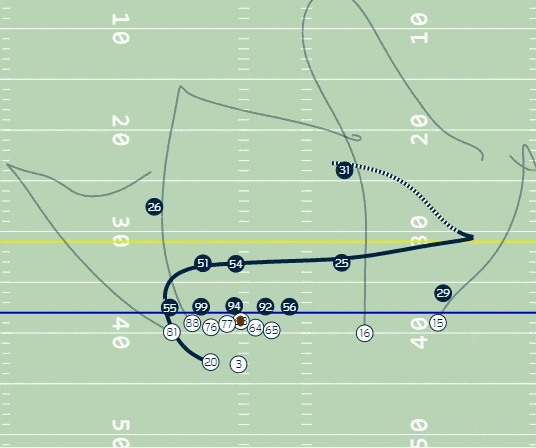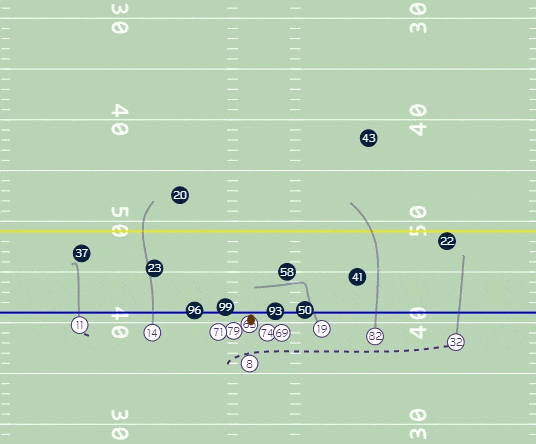Russell Wilson will be on the run Sunday as the Seattle Seahawks take on the Los Angeles Rams. We know that because the 29-year-old quarterback is seemingly always on the run due to a porous offensive line.
Right?
What if we told you that wasn't actually the case? Yes, Aaron Donald & Co. will likely cause problems for Seattle, but according to analysis based on new player tracking information, the much-maligned Seahawks offensive line might actually be decent at pass blocking -- and it might not have been bad last season, either. It might just be an unfair victim of more traditional statistics.
ESPN's new pass block win rate (PBWR) metric using NFL Next Gen Stats examines pass protection relative to time after the snap. Pressure isn't binary; a lineman getting beat after 1.5 seconds is horrific, while sustaining a block until three seconds is OK. That's why we rely on a survival analysis to determine each team's and player's rate of success at various points in time after the snap.
The Seahawks actually have the NFL's fourth-best PBWR 2.5 seconds after the snap -- roughly the average time to throw. Left tackle Duane Brown, whom Seattle acquired in a trade from the Houston Texans midway through last season, has sustained his blocks for at least 2.5 seconds at an 87 percent clip, the ninth-best rate among tackles in the league. Center Justin Britt and guard J.R. Sweezy rank 20th and 21st, respectively, among interior offensive linemen in the same metric.
Seattle was a capable pass-blocking team in 2017, too, ranking 11th best (51 percent) in PBWR, though the Seahawks were blitzed at a below-average rate.
But of course, the constant pressure on Wilson isn't coming from our collective imagination. Overall, Wilson was placed under duress at the second-highest rate last season, and so far he has seen the third-highest rate this season.
So if the pressure doesn't stem from his protection, what does it come from?
The culprit is the length of time Wilson holds the ball, which was longer on average than any other passer in the NFL last season. In four games this season, Wilson has been a little faster to release and holds the 12th-longest time to throw, per NFL Next Gen Stats. That leads to plays like this Wilson completion to running back Rashaad Penny against the Denver Broncos:

Wilson was pressured on that play, but the offensive line also did a solid job. By our measure, the first pass block failure was recorded 2.9 seconds after the snap, which is plenty acceptable.
Let's be perfectly clear: This analysis is not a knock on Wilson. The Seahawks' quarterback is one of the best and most productive in the game and the improvisation magic he brings to extended plays is very much a factor in what makes him so great.
But he doesn't deserve extra credit for putting up strong numbers in the face of so much pressure. It's a frequent talking point in favor of including him in MVP discussions each year. Frankly, I'm pretty sure I've used that same logic myself. But in reality, Wilson invites that pressure and then simply thrives in the face of it.
While Wilson's holding the ball for a long time is responsible for his being under pressure at a high rate, the reason he hangs on to the football may not entirely be up to him. It's possible that Seahawks receivers may struggle to get open or Seattle's scheme relies on slow-developing plays that force Wilson to hold the ball. But while the Seahawks have had changes at receiver and offensive coordinator over the past couple of seasons, Wilson remains a constant, suggesting there's at least a strong chance that it's Wilson's specific style that's the main factor.
Even as we debunk the myth of the Seahawks' offensive line, the big men up front will have to be great come Sunday, when the Rams walk into CenturyLink Field. The inverse of our pass block wins metric is pass rush win rate (PRWR), and there has been no team faster at getting those wins than the Rams.
Los Angeles' pass rush starts most critically with Donald, who has the highest PRWR (51 percent) among any player with at least 60 pass rushes this season. To put it another way: Donald has beaten his blocker within 2.5 seconds at the same rate as Carolina's Kawann Short has within 3 seconds. With Donald, sometimes it's over before you know it, like it was for Kirk Cousins in the animation below, even with some of his Minnesota Vikings receivers running short routes.

It's inevitable Wilson will be sprinting away from trouble this Sunday afternoon. But it will have a lot more to do with his own razzle-dazzle style and the Rams' pass rush than it does with Seattle's pass protection.
Brian Burke contributed to this article.
